Coming back to our senses on stressful, hectic, busy days often requires conscious effort. As with everything else we want to install our inner hard-drive, training is a good way to anchor relaxation and awareness techniques into our system.
Best-case scenario: we have learned relaxation tools early on in our lives, and are remembering to use them on a regular basis at present. Worst-case scenario: we don’t remember anything in a stressful situation.
How to consciously relax in such a moment? Keeping it simple is one of the greatest tools I have ever ‘learned’ – a.k.a I have unlearned to be complicated. What can we focus on at any time, no matter what situation we are in? Our breath.
While reading this, focus on your breath for a minute – what do you notice? Have you just taken a deep breath, remembering to consciously breathe? (I did!)
We take our body and its amazing way of functioning for granted so much, we move our extremities automatically. We hold our body automatically, not consciously keeping the spine straight, or putting one foot in front of the other in a focused way.
We automatically breathe – often times these are shallow breaths we take, rather than inhaling deeply to fill our lungs with precious oxygen. We eat and drink automatically, healthy stuff or not-so-healthy stuff.
The list goes on and on. We are so used to our body doing its work that we forget how much better we could serve it with our awareness, and how big the rewards can be in return.
Many people tend to hold their breath when in a stressful situation, and only when the body needs air they breathe out on autopilot before starting to breathe ‘normally’ (= shallow) again.
Depending on the situation, the monkey-mind might get really loud also, making it seemingly impossible to relax at all. This deep-breathing thing might need some time to do the trick, and it is so worth practising it.
To calm the mind, we can vary our breathing – we can breathe in through the nose, and out through the mouth, blowing the air out audibly.
By giving our monkey-mind something to do, it can concentrate on directing the breath, rather than hopping about thinking a gazillion thoughts in five seconds. When we are in sync with brain and body, we usually calm down automatically, and fast.
Once the monkey-mind has mastered the nose-mouth-technique and starts galloping again, we can change our breathing. Breathing in through only one nostril, closing the other one with one finger.
And breathing out through the mouth. Focusing on the in-breath ONLY going in through one nostril occupies the mind… Swapping nostrils can further help focusing on just breathing.
And after having breathed in through both nostrils singularly, we can focus on the in-breath coming through both nostrils again. Sounds complicated? Try it out, and have some fun with it!
Another tool we can use for relaxation no matter where we are or what situation we are in is to chant a word or a sentence. It can be a mantra, it can be any word, or it can be just one letter.
In my work with children, I call this their personal magic spell that will help them to calm down fast. The simpler the phrase/word, the more effective, as repetition might tire the mind, and it might simply switch off – which means we can relax.
Maybe you already work with affirmations and mantras, or you have done in the past and simply forgotten about it. Re-examine the words and phrases you have used, and see if they still work for you.
Or find new magic spell that helps you to come back to calm. Sometimes, a heartfelt ‘fuck,’ (repeat as often as necessary!) does the trick, and sometimes a phrase like ‘I am calm, so calm’ eases our stress levels.
There are so many ways on the path to relaxation, and the above-mentioned are two that I can recommend from my own experience. Since I found my magic spell thirteen years ago, the monkey mind switches off immediately when I am in bed and I say it in my mind.
My whole system has learned to follow that magic spell, as I have taught my body-mind system that when I use that phrase, I mean that I want to go to sleep. And it works every time.
Once you’ve tried out the breathing techniques, and the chanting/affirmations – why not combine them? Our mind wants to be productive and learn things.
The whole system benefits from this curiosity and thirst of knowledge; and what’s better than teaching ourselves good stuff that might even help the people around us, with us being in a regular state of conscious relaxation?
Wishing you lots of fun with finding your personal magic spell and practising it!
You can find much more information on living a holistic lifestyle in these free magazines and on our YouTube channel.
 Barbara Patterson – Conscious Awareness Teacher
Barbara Patterson – Conscious Awareness Teacher






